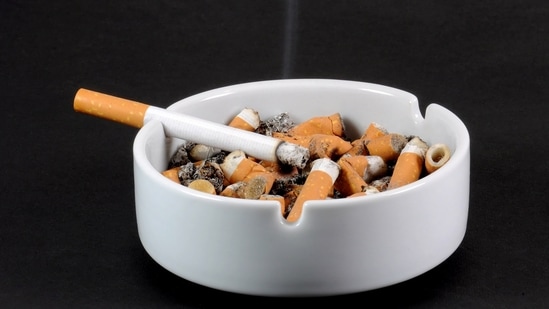Reduced-nicotine cigarettes make anxious smokers smoke less
Prior studies suggest that lowering nicotine levels could aid smokers in quitting, but there is little proof that these regulations would be harmful to those who already suffer from affective disorders like depression and anxiety disorders.
According to Penn State College of Medicine and Harvard Medical School researchers, reducing the quantity of nicotine in cigarettes to non-addictive levels may help smokers with mood or anxiety issues quit without harming their mental health.

The findings were released in the journal PLOS ONE.
They claimed that lowering the amount of nicotine in cigarettes could minimise addiction, reduce exposure to toxins, and improve smokers' chances of quitting.
In the United States, tobacco use continues to be the biggest preventable cause of early death and disease. The U.S. Food and Drug Administration and the government of New Zealand recently made plans to reduce the quantity of nicotine in cigarettes to levels that are not highly addictive.
ALSO READ: Heart health tips by experts for people with asthma
Prior studies suggest that lowering nicotine levels could aid smokers in quitting, but there is little proof that these regulations would be harmful to those who already suffer from affective disorders like depression and anxiety disorders, which affect an estimated 38 per cent of smokers in the United States.
Professor of psychiatry and behavioural health Jonathan Foulds asserts that smokers with mental health issues are more likely to have severe nicotine withdrawal symptoms and have less success quitting. He added that there is concern that reducing the amount of nicotine to extremely low levels can exacerbate the psychiatric symptoms of smokers who have mental health disorders, encourage greater smoking, and expose them to more toxicants (hazardous substances).
The study included 188 smokers who had no intentions of quitting smoking and had a history of, or were currently experiencing a mood or anxiety condition. Volunteers were divided into two groups at random and given either study cigarettes with the standard nicotine content (11.6 mg/cigarette) or cigarettes with nicotine that was gradually reduced over an additional 18 weeks until it was just 0.2 mg/cigarette.
Researchers assessed levels of cotinine, a nicotine metabolite, hazardous chemical concentrations, cigarette dependence indices, and various mental health indicators at the start and end of the trial.
At the end of the study, the researchers found no statistically significant differences in the mental health parameters between the two groups. The Kessler Psychological Distress Scale was employed by the researchers; it consisted of six self-report items where participants graded how much they felt "nervous," "hopeless," or "so miserable that nothing could cheer them up." Points for each of the six experiences are added together to get scores.
In contrast to participants in the standard nicotine content group, who scored an average of 6.1 at the start of the trial and finished around 4.9, individuals in the reduced nicotine content group scored an average of 5.3 at the beginning of the study and finished at an average score of 4.6.
"These findings are important because we want to understand the effect these policies would have on smokers with anxiety or depressive disorders," said Foulds, a Penn State Cancer Institute researcher. "Our data showed that there wasn't a significant difference in mental health measures between the groups, suggesting reduced nicotine cigarettes might not have adverse psychological effects on this population."
Foulds and team discovered that groups in the lowered nicotine content group were absorbing less nicotine and eating less dangerous carcinogens such as the biomarker 4-(methylnitrosamino)-1-(3-pyridyl)-1-butanol), also known as NNAL. This finding is consistent with earlier studies. By the time the trial's randomised phase was up, members of that group had likewise cut back on their cigarette smoking and reported having less nicotine addiction.
Unique to this study, participants in both groups were also given the choice to "choose their treatment," after the 18-week period. They could go back to using their own cigarettes, continue smoking the research cigarettes or attempt to quit. Of the 188 participants in the study, those randomized to reduced nicotine content cigarettes were more likely to have quit smoking 12 weeks later (18.1 per cent), compared to those in the control (usual nicotine content) group (4.3 per cent).
"We believe this is the first randomized trial to find that smokers who used very low nicotine cigarettes were significantly more likely to have quit smoking (with biochemical verification), three months after the end of the trial," Foulds said.
"Our results suggest that these policies will likely result in reduced nicotine absorption from cigarettes without worsening the mental health of smokers with mood or anxiety disorders," said Dr Eden Evins, Cox Family Professor of Psychiatry at Harvard Medical School. "They also suggest that with proper support and resources, smokers with mood and anxiety disorders could quit successfully as a result of these policies."
Catch your daily dose of Fashion, Health, Festivals, Travel, Relationship, Recipe and all the other Latest Lifestyle News on Hindustan Times Website and APPs.



